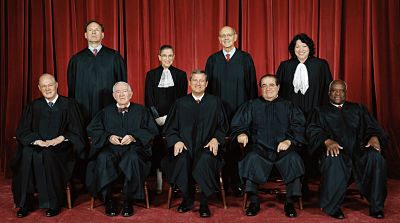
Editor’s Note: This is a post by Professor Jim Voelz in light of Will Schumacher’s post on Justice Stevens’ retirement from the Supreme Court. Even though it is a reprint from the October 2003 issue of Concordia Journal, it still speaks to the semiotic conditions of the court, and he vows to speak further to the matter should he be pressed on it by comments below.
The cross-burning case (Virginia vs. Black) before the Supreme Court late last year [2002] has reopened interest in freedom of speech, especially because of the comments of Justice Clarence Thomas. In addition to the importance of the specific case, however, the entire issue should bring to our attention the fact that our courts deal with laws and situations with a curious and serious interpretive naiveté. They seem to have little knowledge of the field of semiotics, which is the theory of signs and how they both convey meaning and function—signs not only in documents (e.g., words and sentences) but also in life (e.g., concrete actions and things). First, the justices seem to have no conscious awareness of the difference between semantics and pragmatics. The former concerns itself with the meaning of a sign, e.g., the meaning of a word or an action in a given context, while pragmatics deals with its impact, e.g., whether the meaning conveyed constitutes a warning, a threat, a promise, etc. Now, these are not the same categories and the difference between them is not trivial. If we are guaranteed freedom of speech in the United States of America, are we guaranteed both freedom of expression of meaning and freedom of intent of impact? Deputy solicitor general Michael R. Dreeben has apparently sensed the distinction I am urging, because, according to Jonah Goldberg (“Court case illustrates the curious convolution of our First Amendment” St. Louis Post-Dispatch, December 18, 2002, C19), he has argued that “historically burning the cross was not expression but ‘akin to a threat to put somebody in fear of bodily harm’ and therefore ‘is not protected by the First Amendment.”‘ Indeed. Justice Thomas, according to Goldberg, replied with these words: “‘My fear is you are actually understating the symbolism of and effect of the burning cross.’” Here is precisely the distinction I am suggesting (though Thomas does not distinguish them): symbolism = semantics and effect = pragmatics. Note how Thomas is said to have continued: ‘”There was no communication…It was intended to cause fear…’” (emphasis added).
The question now becomes: What is the relationship between the First Amendment of the Constitution of the United States and pragmatics? Does this amendment cover the pragmatics of discourse and action, i.e., its impact, whether intended or actual (though this distinction is still another matter!)? In my view, solicitor Dreeben has it right.
But here is a second point, which elsewhere I have called “entailment.” When nouns are related to verbal ideas, e.g., as “sale” is to selling and as “speech” is to speaking, they are much more difficult and complex to interpret than are nouns which denote simply things, e.g., “grass,” “tree,” “street.” In fact, an entire sentence is usually concealed in them along with the modifiers associated with them. For example, the phrase “shoe sale” conceals something like “(a given store) is selling shoes (at lower prices).” Who is doing the selling and at what price must be determined from context. Now, the same is true with the phrase “freedom of speech.” This conceals a sentence along the lines of “We are free to speak about X.” The problem in our current context is not the definition of the words “freedom” and “speech.” Rather, it is the identity of the X in the sentence above! Goldberg points this out when he says that virtual pornography seems to be protected by current court interpretations, while ability to criticize political candidates (because of campaign finance reform) is not. In other words, it’s a problem of entailment. Surely our country’s founders had in mind the following entailment/concealed sentence in the First Amendment: “We are free to speak about political matters.” It’s not a stretch to think that they did not have in mind: “We are free to speak about adults having sex with children and infants.” The entailment of a word like “speech” is unexpressed in the Constitution, probably because it was assumed “to be self-evident” (which today it is not).
And you thought that the kind of issues you considered in hermeneutics class were of concern only to pastors and professors who wrestle with the “non-contemporary,” authoritative texts of the sacred scriptures!

Leave a Reply
You must be logged in to post a comment.